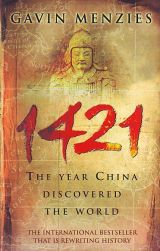


|
|
1421: The Year China Discovered The World (Paperback)
by Gavin Menzies
| Category:
China, History & Culture |
| Market price: ¥ 178.00
MSL price:
¥ 158.00
[ Shop incentives ]
|
| Stock:
Pre-order item, lead time 3-7 weeks upon payment [ COD term does not apply to pre-order items ] |
MSL rating:
 Good for Gifts Good for Gifts |
| MSL Pointer Review:
In this well reasoned and written book, Menzies has brought a common sense to re-examine the widely accepted belief that Columbus discovered America. |
| If you want us to help you with the right titles you're looking for, or to make reading recommendations based on your needs, please contact our consultants. |

Detail |

Author |

Description |

Excerpt |

Reviews |
|
|
|
Author: Gavin Menzies
Publisher: Harper Perennial
Pub. in: January, 2004
ISBN: 006054094X
Pages: 656
Measurements:
Origin of product: USA
Order code: BA00995
Other information: ISBN-13: 978-0060540944
|
|
Rate this product:
|
|
- Awards & Credential -
Gavin Menzies pieced together the events of China discovery and exploration of the world. No doubt this book will challenge many people's ideas about Columbus' all-known exploration. |
|
- MSL Picks -
Compelling evidence that the Chinese were the first great maritime explorers - not the Europeans. Rewrite the history books!
In 1421, the largest fleet the world had ever seen sailed from its base in China. The ships, huge junks nearly 500 feet long and built from the finest teak, were under the command of Emperor Zhu Di?s loyal eunuch admirals. Their mission was to proceed all the way to the end of the earth to collect tribute from the barbarians beyond the seas and unite the whole world in Confucian harmony. Their journey would last over two years and circle the globe.
When they returned, Zhu Di had lost power and China was beginning its long, self-imposed isolation from the world. The great ships rotted and the records of their journeys were destroyed. Lost was the knowledge that Chinese ships had reached America 70 years before Columbus and circumnavigated the globe a century before Magellan. They had also discovered Antarctica, reached Australia 350 years before Cook, and solved the problem of longitude 300 years before the Europeans.
In this fascinating historical detective story, Gavin Menzies shares the remarkable account of his discoveries and the incontrovertible evidence supporting them.
(Quoting from The Publisher)
Target readers:
Any readers who are interested in Chinese history, world history or the great discovery of world geography.
|
|
Gavin Menzies, Royal Navy Submarine Commanding Officer, retired, was born in 1937 and lived in China for two years before WW2. While in command of HMS Rorqual he sailed the routes pioneered by Magellan and Captain Cook. In the course of researching 1421, he visited 120 countries, over 900 museums and libraries and every major sea port of the late Middle Ages.
|
|
From The Publisher
Compelling evidence that the Chinese were the first great maritime explorers - not the Europeans. Rewrite the history books!
In 1421, the largest fleet the world had ever seen sailed from its base in China. The ships, huge junks nearly 500 feet long and built from the finest teak, were under the command of Emperor Zhu Di’s loyal eunuch admirals. Their mission was to proceed all the way to the end of the earth to collect tribute from the barbarians beyond the seas and unite the whole world in Confucian harmony. Their journey would last over two years and circle the globe.
When they returned, Zhu Di had lost power and China was beginning its long, self-imposed isolation from the world. The great ships rotted and the records of their journeys were destroyed. Lost was the knowledge that Chinese ships had reached America 70 years before Columbus and circumnavigated the globe a century before Magellan. They had also discovered Antarctica, reached Australia 350 years before Cook, and solved the problem of longitude 300 years before the Europeans.
In this fascinating historical detective story, Gavin Menzies shares the remarkable account of his discoveries and the incontrovertible evidence supporting them.
|
|
|
|